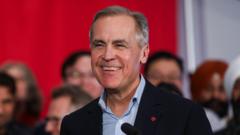As President-elect Trump threatens a 25% tariff on Canadian imports, Windsor, Ontario, fears for its automotive economy, which lies at the core of its livelihood, prompting officials and business leaders to voice their anxieties about the region's future.
Concerns Loom in Windsor Amid Trump's Proposed Tariffs

Concerns Loom in Windsor Amid Trump's Proposed Tariffs
The Canadian city heavily reliant on the auto industry faces potential devastation from looming import duties.
In the heart of Windsor, Ontario, concerns reverberate through the automotive industry as President-elect Donald J. Trump prepares to take office, bringing with him the specter of economic upheaval. The looming threat of a 25 percent tariff on Canadian imports could significantly harm this city, known affectionately as Canada’s “Suburb of Detroit,” which has been tightly entwined with the U.S. automotive market for decades.
According to Bruce Lane, president of Lanex Manufacturing—a crucial auto-parts manufacturer—uncertainty has gripped the workforce. "Everybody’s waiting for the next shoe to drop,” Lane expressed, highlighting the anxiety that tariffs could spell disaster for Windsor, which is fundamentally reliant on its automotive sector.
Windsor’s connection to the automotive industry goes beyond mere statistics; it is a community deeply integrated with its neighbors across the Detroit River. As vehicles are assembled and parts manufactured in their proximity, the potential tariffs threaten not just jobs but the very fabric of the local economy. Prime Minister Justin Trudeau underscored this connection during a visit to a local steel plant, noting the city's unique exposure to trade with the United States.
The impact of Trump's proposed tariffs could disrupt the intricate supply chains that have characterized the North American automotive sector, potentially leading to significant job losses and economic fallout. As Windsor’s residents and officials brace for the new administration, there is a sense that the region's future hangs precariously in the balance.
According to Bruce Lane, president of Lanex Manufacturing—a crucial auto-parts manufacturer—uncertainty has gripped the workforce. "Everybody’s waiting for the next shoe to drop,” Lane expressed, highlighting the anxiety that tariffs could spell disaster for Windsor, which is fundamentally reliant on its automotive sector.
Windsor’s connection to the automotive industry goes beyond mere statistics; it is a community deeply integrated with its neighbors across the Detroit River. As vehicles are assembled and parts manufactured in their proximity, the potential tariffs threaten not just jobs but the very fabric of the local economy. Prime Minister Justin Trudeau underscored this connection during a visit to a local steel plant, noting the city's unique exposure to trade with the United States.
The impact of Trump's proposed tariffs could disrupt the intricate supply chains that have characterized the North American automotive sector, potentially leading to significant job losses and economic fallout. As Windsor’s residents and officials brace for the new administration, there is a sense that the region's future hangs precariously in the balance.























